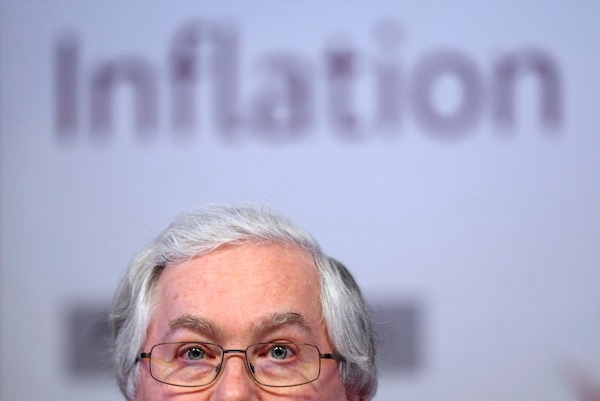Is manipulating interest rates really as shocking to the Chancellor and the Governor of the Bank of England as they make it out to be? The Libor and Euribor fixing scandal has shown several bankers at it, yet this weekend there were suggestions that at least some of these bankers thought that the regulators, the Bank of England and even the Treasury were aware of the scam – and had a shared interest in keeping the official borrowing rate down so as not to spread panic. This reminds us what an extraordinary situation the Old Lady of Threadneedle St finds herself in.
On Friday, Governor Mervyn King lambasted banks and bankers for being ‘shoddy’ and ‘deceitful’ over the Libor scandal. The BoE is not directly responsible for Libor (though this article [http://specc.ie/LY9nXJ] from Robert Peston suggests it’s not entirely divorced from it, either). Still, it’s slightly surreal when the central bank chief sounds as though he’s only just been introduced to a business culture in which he was enmeshed for over a decade. The whole point of the “governor’s eyebrow” is that it is raised in alarm during misdeeds, not raised in astonishment years afterwards.
On Wednesday Sir Mervyn said the nation faced ‘at least another five years of pain’ due to the crisis in the eurozone, which was spreading to Asia. The Governor spoke as if there was not the slightest question of the Bank of England having a hand in this sad state of affairs. He spoke as of the crisis was, like the old SARS virus, something sweeping in from other shores.
It’s worthwhile remembering why the UK can borrow so cheaply. The low gilt yields, that the Chancellor regularly boasts about, are made artificially lower by his Quantitative Easing programme: possibly the biggest monetary experiment the world has ever seen.
As we pointed out back in February, King’s ‘quantitative easing’ or QE transfers wealth from savers to borrowers on a massive scale, eating into the pensions of the elderly and stoking inflation – all done with little consensus from the public. This week the Bank may pump in another £50 billion to the eye-watering £375 billion already deployed to help ‘stimulate’ the economy. The way that the BoE does QE (using the freshly-minted cash to buy only government debt) means that the main UK debt interest rate will be manipulated downwards. You can argue that this is good, even vital. But why does Mr Osborne never refer to this effect of QE in his many, many references to the low gilt yields?
So large is QE that it has implications beyond the economic: it is political. As HSBC pointed out in a recent research report, the BoE, the Fed, the ECB and the Bank of Japan now have, as a result of their various QE programmes, more than a combined $9 trillion on their balance sheets – a sum so large it’s impossible that it doesn’t also touch the remit of governments. ‘By supporting bond markets and keeping yields down, QE has aided governments in fiscal difficulty. So central banks may be pressured to continue purchasing assets,’ said the report. ‘The heyday of independent central banking could be drawing to a close.’
If we translate this to what it means in the UK context: King’s policy helps Osborne by keeping the government’s borrowing costs low (at the expense of the private sector), and the government is unlikely to want this blithe state of affairs to end. On top of this, Britain’s central bank is on the cusp of having vastly increased powers – next year, it will take over some of the FSA’s responsibility of supervising banks, and will have greater purview over financial stability. This puts the BoE in a paradoxical place – such is the nature of a central bank that, the larger a mandate it has, the more prone to political pressures it becomes – thus facing a bigger risk to its autonomy. More powers often lead to less independence.
Furthermore, all these new weapons will be handled by a fresh leader. King steps down next year and many names have been floated, from Goldman Sachs’ Jim O’Neill to current Deputy Governor Paul Tucker (and intriguingly, the Bank of Canada’s Mark Carney at one point, raising the possibility of a foreign Governor in a greatly empowered and politicised position). All this, and the severe fallout of the eurozone to manage and the BoE’s own position vis-a-vis its continental counterparts to ascertain in the months ahead. No matter how demure or distant a pose Sir Mervyn would like to strike, this is in every way a monumental period for Britain’s central bank. And playing with the interest rate is a game that a long line of distinguished people would like to participate in.






Comments